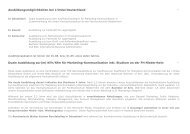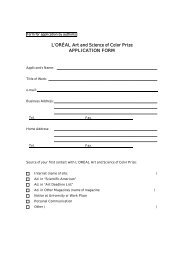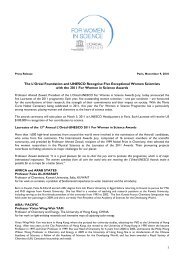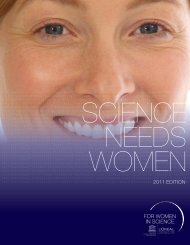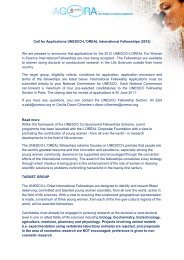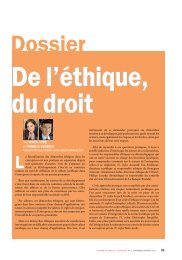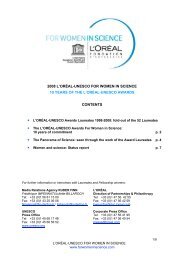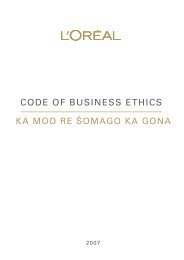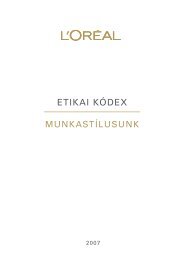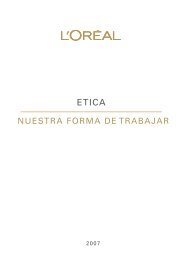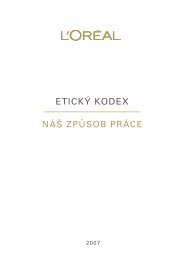CONTENTS - L'Oréal
CONTENTS - L'Oréal
CONTENTS - L'Oréal
Create successful ePaper yourself
Turn your PDF publications into a flip-book with our unique Google optimized e-Paper software.
of lactic bacteria present in unpasteurized camel milk.<br />
By cloning the target genes identified in the different<br />
strains, expressing them individually in one single strain<br />
of the bacterium and then comparing their protein<br />
degrading activity, she hopes to be able to determine the<br />
genetic basis for each enzyme’s specific action.<br />
On return to Algeria, Habiba Drici plans to apply the<br />
newly acquired techniques to improve selected strains of<br />
lactic bacteria found in unpasteurized milk in Algeria for<br />
possible use in industrial cheese manufacture. She<br />
would also like to set up a new line of research on the<br />
production of lactic ferments in her home university with<br />
the aim of training a new generation of engineers<br />
specialized in cheese production.<br />
Host institution: Laboratory of Microbiology and<br />
Genetics, Claude Bernard University (Lyon I),<br />
Villeurbanne, France. �<br />
Jordan<br />
Clinical Nutrition<br />
Reema Fayez TAYYEM, 33, PhD in clinical nutrition,<br />
is an assistant professor in the Faculty of Allied Health<br />
Sciences at the Hashemite University in Al-Zarqa,<br />
Jordan, where she teaches nutritional science.<br />
Dr Tayyem is interested in assessing whether the<br />
consumption of curcumin has an inhibitory effect on the<br />
development of colon cancer.<br />
FELLOWS UNESCO-L’ORÉAL 2005<br />
Curcumin is a yellow pigment from the root of Curcuma<br />
longa (or turmeric), a ginger-like plant that grows in<br />
tropical regions and is commonly used as a spice.<br />
Recent studies have shown that curcumin has particular<br />
chemical properties which make it a useful anti-cancer<br />
agent. It has the ability, for example, to selectively inhibit<br />
cancer cell division and to inhibit angiogenesis (the<br />
formation of new blood vessels) in certain cancers,<br />
including colon cancer.<br />
In her study, Dr Tayyem will make a statistical<br />
comparison of a group of colon cancer patients with a<br />
group of healthy participants in four different areas of<br />
Jordan, two of which have a high prevalence of colon<br />
cancer and two of which have a low prevalence of the<br />
disease. Using a questionnaire, she will determine the<br />
dietary curcumin intake of each participant and will also<br />
undertake chemical analysis and measurement of<br />
curcumin in blood and food samples.<br />
Dr Tayyem will use her time in Arizona to perfect her<br />
questionnaire and acquire knowledge of the<br />
biostatistical methods necessary to conduct this type of<br />
study. She will also develop an assessment tool for<br />
measuring curcumin in food and blood samples.<br />
Once her results have been analyzed she will evaluate<br />
whether her findings are in keeping with other studies in<br />
the field and apply this information in cancer prevention<br />
initiatives in Jordan.<br />
Host institution: Division of Health Promotion<br />
Sciences, Arizona College of Public Health and Arizona<br />
Cancer Center, Tucson, USA. �



